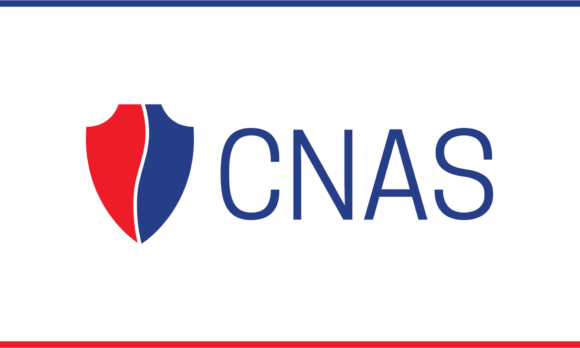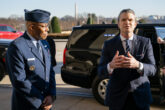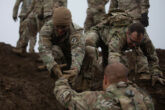April 09, 2020
Sharper: America's National Security Workforce
Analysis from CNAS experts on the most critical challenges in U.S. foreign policy.
The greatest source of strength in American national security is the people who lead and serve within its institutions. The ongoing U.S. response to the global coronavirus outbreak has underscored the critical role of America's workforce. Investing in the health, diversity, professional development, oversight, and effectiveness of this workforce remains essential for long-term U.S. competitiveness.
CNAS experts continue to examine the challenges and opportunities facing America's national security institutions, including the armed services, federal agencies, the United States Congress, and more. Continue reading this edition of Sharper to explore their recommendations for strengthening U.S. competitiveness by investing in America's national security workforce.
Reports and Policy Briefs
The federal national security workforce has entered a perfect storm shaped by workforce demographic trends, short-sighted leadership, slow adaptation to modern challenges, and inflexible talent acquisition and management. In a 2019 briefing for Congress, CNAS Deputy Director of Studies Loren DeJonge Schulman argued that this dynamic must change and Congress should treat civilian human capital as a vital building block in America's foreign policy.
In a February report, researchers from the CNAS Military, Veterans, and Society Program examined the challenges facing veterans who are women, LGBT, or racial and ethnic minorities in New York state and nationwide. They identified multiple disparities in veteran outcomes across critical life domains and makes recommendations for how researchers, veteran service organizations, and the Department of Veterans Affairs can best support the needs of an increasingly diverse veteran population.
Managing the National Security Workforce Crisis
The federal national security workforce is entering a perfect storm shaped by workforce demographic trends, short-sighted leadership, slow adaptation to modern challenges, and...
New York State Minority Veteran Needs Assessment
It is imperative to develop a deeper understanding of whether there are specific veteran subpopulations that are faring differently from their peers...
Commentary
Experts from across the Center have offered timely analysis on strengthening America's national security workforce.
- Last December, Kayla M. Williams testified before a subcommittee of the House Armed Services Committee, telling members of Congress that "there is no reason that services cannot or should not set significantly more aggressive goals for recruiting women – and raise them again once they are met."
- Susanna V. Blume wrote in Defense One that "rather than accepting delays in essential but not urgent tasks (like building annual budgets), the [Department of Defense] needs to ensure that it can weather shocks like COVID-19 by enabling service members and civilians who can do their jobs remotely to do so."
Increasing Diversity in the Military: Recruiting and Retaining Talented Women
I. Boots-on-the-Ground Assessment Chairwoman Speier, Ranking Member Kelly, distinguished members of the Committee, thank you for the opportunity to discuss a topic I believe i...
Let Them Work From Home
Earlier this week Defense One reported that senior military service branch representatives requested a one-month delay in the submission of their annual budgets, arguing that ...
- In an August 2019 working paper, Carrie Cordero argued that "changes that are both achievable and have the potential to improve public confidence in the [intelligence] committees and the intelligence community mostly involve a relatively modest set of rules adjustments and informal processes."
- Loren DeJonge Schulman wrote for Defense One in January that "with its democratic values, open economy, and diverse citizenry, the United States possesses a number of distinct advantages in the development of human capital, and public service remains a top career choice for young people."
Enhancing Congressional Intelligence Committee Effectiveness
In a new working paper, Carrie Cordero provides a fresh assessment regarding whether the intelligence committees in Congress need significant structural reforms, assesses whic...
National Security Is Made of People
For several years, members of Congress and senior defense officials have worried, dramatically and out loud, about the state of military readiness, devoting bipartisan harangu...
- In a March 2020 commentary for the Center, Emma Moore found that "sufficient time has passed to note the status of integration across components and to see returns on recruitment and retention."
- COL Sarah Albrycht warned in a February piece for Fifth Domain: "Advances in digital technology combined with unregulated data collection threaten to make the homefront the military’s new front line."
- In May 2019, Elsa B. Kania and Emma Moore argued in Defense One that "talent is and will remain at the core of America’s competitive advantage over China."
Women in Combat: Five-Year Status Update
It has been five years since the ban on women in combat was lifted in 2015 and women began integrating previously closed combat arms billets in January 2016. Five years is the...
When the homefront becomes the (cyber) front line
American soldiers have long marched off to war with one assurance: by fighting abroad they were keeping their families safe at home. Today, advances in digital technology comb...
Great Power Rivalry Is Also a War For Talent
China’s military is working harder to find and keep good people. The U.S. must step up its own efforts....
In the News
Featuring commentary and analysis by Loren DeJonge Schulman, Paul Scharre, Jason Dempsey, Amy Schafer, and Emma Moore.
When fighting bureaucracy means disbanding a pandemics office
When PBS journalist Yamiche Alcindor recently asked President Donald Trump about his decision to disband the National Security Council’s office for pandemics, Mr. Trump said t...
Immigrant doctors want to help the Army fight the coronavirus. The Pentagon won’t let them.
Dozens of immigrant physicians who enlisted through a Pentagon program meant to harness their medical skills are stuck taking out trash and filing paperwork, an immigration at...
How veterans may be overwhelmed by too many programs to help them find jobs
A flood of new initiatives to help recently separated servicemembers find post-military employment may be overwhelming veterans in their job searches, according to a new repor...
White House Seeks to Establish More ROTC Programs at HBCUs
The White House Initiative on historically black colleges and universities wants HBCUs to expand Army Reserve Officers' Training Corps programs on their campuses and modernize...
Across the Center
Renewing American competitiveness will require a strong, skilled, and diverse national security workforce. Now more than ever we need to empower and equip the next generation of national security and foreign policy professionals. It’s time to make room for diversity across the national security space—on the Hill, in the Situation Room, and at think tanks. Make Room aims to empower communities underrepresented in national security, educate the next generation of leaders, and provide a platform to share their expert perspectives.
This January, CNAS launched “America Competes 2020,” a Center-wide initiative to renew American competitiveness at home and abroad. Amid increasingly fractured and partisan policy debates, CNAS will produce specific, actionable policy recommendations for how the United States can compete more effectively across a range of vital national security arenas.
Make Room
Make Room is an inclusive professional development network where early professionals are equipped to pursue their career goals and develop their leadership skills. Founded in ...
America Competes 2020
America Competes 2020 is a Center-wide initiative featuring cutting-edge CNAS research, publications, events, and multimedia aimed at strengthening the United States’ strategi...
About the Sharper Series
The CNAS Sharper series features curated analysis and commentary from CNAS experts on the most critical challenges in U.S. foreign policy. From the future of America's relationship with China to the state of U.S. sanctions policy and more, each collection draws on the reports, interviews, and other commentaries produced by experts across the Center to explore how America can strengthen its competitive edge.
Subscribe
Sign up to receive the latest analysis from the CNAS expert community on the most important issues facing America's national security.
Thank you for registering! You will receive a confirmation email shortly. All CNAS events are free, open to the public, and viewable from cnas.org/live.
Stay up-to-date with report releases, events, major updates, and announcements from the Center for a New American Security.
More from CNAS
-
Hegseth Brings the Culture War to Combat
The fundamental challenge of military leadership lies in creating cohesive teams that can work together in an environment of mortal risk and, when called upon to do so, use le...
By Dr. Jason Dempsey
-
Hegseth Says Trump Boosted Military Recruiting. It’s Been Improving for over a Year
Defense Secretary Pete Hegseth says military recruiting has shot up since the Trump administration's return. In fact, it's been improving for at least a year, with big jumps i...
By Taren Sylvester
-
Pete Hegseth’s Views About Women and Military Standards
In recent weeks, Hegseth walked back comments made while promoting his book, where he said women did not belong in ground combat units. Without citing specific examples, he co...
By Katherine L. Kuzminski
-
Make America the Biopower
No country has a better biotechnology hand than America. The administration has a historic opportunity to play it wisely and secure the United States’ position as the 21st cen...
By Vivek Chilukuri


















